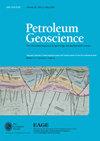The importance of facies, grain size, and clay content in controlling fluvial reservoir quality – An example from the Triassic Skagerrak Formation, Central North Sea, UK
IF 2.1
4区 地球科学
Q3 GEOSCIENCES, MULTIDISCIPLINARY
引用次数: 2
Abstract
Clay-coated grains play an important role in preserving reservoir quality in high-pressure high-temperature (HPHT) sandstone reservoirs. Previous studies have shown that the completeness of coverage of clay coats effectively inhibits quartz cementation. However, the main factors controlling the extent of coverage remain controversial. This research sheds light on the influence of different depositional processes and hydrodynamics on clay coat coverage and reservoir quality evolution. Detailed petrographic analysis of core samples from the Triassic fluvial Skagerrak Formation, Central North Sea, identified that channel facies offer the best reservoir quality; however, this varies as a function of depositional energy, grain size and clay content. Due to their coarser grain size and lower clay content, high energy channel sandstones have higher permeabilities (100-1150 mD) than low energy channel sandstones (<100 mD). Porosity is preserved due to grain-coating clays, with clay coat coverage correlating with grain size, clay coat volume and quartz cement. Higher coverage (70-98%) occurs in finer-grained, low energy channel sandstones. In contrast, lower coverage (<50%) occurs in coarser-grained, high energy channel sandstones. Quartz cement modelling showed a clear correlation between available quartz surface area and quartz cement volume. Although high energy channel sandstones have better reservoir quality, they present moderate quartz overgrowths due to lesser coat coverage, thus prone to allowing further quartz cementation and porosity loss in ultra-deep HPHT settings. Conversely, low energy channel sandstones containing moderate amounts of clay occurring as clay coats are more likely to preserve porosity in ultra-deep HPHT settings and form viable reservoirs for exploration. Supplementary material: of data and technique used in this study are available at https://doi.org/10.6084/m9.figshare.c.6438450.v1相、粒度和粘土含量在控制河流储层质量中的重要性——以英国北海中部三叠系Skagerrak组为例
在高压高温砂岩储层中,粘土包覆颗粒对保持储层质量起着重要作用。前人的研究表明,粘土覆盖层的完备性有效地抑制了石英胶结。然而,控制覆盖范围的主要因素仍然存在争议。该研究揭示了不同沉积过程和水动力对粘土覆盖层和储层质量演化的影响。对北海中部三叠系河流相Skagerrak组岩心样品进行了详细的岩石学分析,发现河道相的储层质量最好;然而,这随着沉积能量、粒度和粘土含量的变化而变化。由于高能量通道砂岩粒度较粗,粘土含量较低,其渗透率(100-1150 mD)高于低能量通道砂岩(<100 mD)。孔隙度的保存是由于颗粒包覆粘土,粘土包覆与颗粒大小、粘土包覆体积和石英胶结有关。较高的覆盖率(70-98%)发生在细粒、低能量的河道砂岩中。相比之下,较低的覆盖度(<50%)发生在粗粒度、高能量通道砂岩中。石英水泥模型显示可用石英表面积与石英水泥体积之间存在明显的相关性。虽然高能量通道砂岩具有更好的储层质量,但由于覆盖层较少,其石英过度生长,因此在超深高温环境中容易进一步发生石英胶结和孔隙度损失。相反,在超深高温环境下,含有适量粘土的低能量通道砂岩更有可能保持孔隙度,形成可勘探的储层。本研究中使用的数据和技术的补充资料可在https://doi.org/10.6084/m9.figshare.c.6438450.v1上获得
本文章由计算机程序翻译,如有差异,请以英文原文为准。
求助全文
约1分钟内获得全文
求助全文
来源期刊

Petroleum Geoscience
地学-地球科学综合
CiteScore
4.80
自引率
11.80%
发文量
28
审稿时长
>12 weeks
期刊介绍:
Petroleum Geoscience is the international journal of geoenergy and applied earth science, and is co-owned by the Geological Society of London and the European Association of Geoscientists and Engineers (EAGE).
Petroleum Geoscience transcends disciplinary boundaries and publishes a balanced mix of articles covering exploration, exploitation, appraisal, development and enhancement of sub-surface hydrocarbon resources and carbon repositories. The integration of disciplines in an applied context, whether for fluid production, carbon storage or related geoenergy applications, is a particular strength of the journal. Articles on enhancing exploration efficiency, lowering technological and environmental risk, and improving hydrocarbon recovery communicate the latest developments in sub-surface geoscience to a wide readership.
Petroleum Geoscience provides a multidisciplinary forum for those engaged in the science and technology of the rock-related sub-surface disciplines. The journal reaches some 8000 individual subscribers, and a further 1100 institutional subscriptions provide global access to readers including geologists, geophysicists, petroleum and reservoir engineers, petrophysicists and geochemists in both academia and industry. The journal aims to share knowledge of reservoir geoscience and to reflect the international nature of its development.
 求助内容:
求助内容: 应助结果提醒方式:
应助结果提醒方式:


